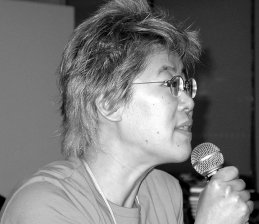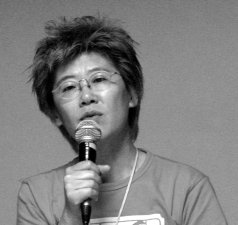A Stop-over with the Director
An Interview with Kyung Soon
Korean feminist and independent film maker Kyung Soon is once more pouring her passion into an ambitious and daring opus on women. Coming from three different countries, cultures, and classes, her characters share one thing – the struggle to gain control over their bodies and lives
Women in Action (WIA): What is the title of your film and what is its storyline?
 (KS): Red Maria. Maria is the symbol of virginity. In the film, the woman is more than a symbol of virginity. She is an independent individual. The movie breaks the taboos and images she has been forced to carry. So it tries to change some common perspectives in our societies.
(KS): Red Maria. Maria is the symbol of virginity. In the film, the woman is more than a symbol of virginity. She is an independent individual. The movie breaks the taboos and images she has been forced to carry. So it tries to change some common perspectives in our societies.
Abortion is just part of the movie. But it is an elementary problem, so trending will be done. It will be highlighted across three countries: Korea, Philippines, and Japan. I think that while these countries have different economic situations, their commonality lies in their perception of the woman. I will show this throughout this film and hopefully, the solution to the problem too. I am still in the first stage of the film. The Philippines is the first country. Then, I will move to Japan and lastly, Korea. I expect the film to be finished by late next year.
WIA: Based on the research you did for this film, what is your impression on the most common problems women from these countries face?
KS: The first time I came to the Philippines, I was not so concerned about these problems. I was just thinking of my next film. But as I traveled to so many places, I saw so many children and came to know the unreasonable problems of Filipino women. Abortion is one of them. I recognise that just by educating the women, they would be able to somehow control their bodies – before, during, or after they get pregnant.
But after this realisation, I also thought that this problem was related to a bigger social system. It is not a problem that is unique to the Philippines. It also happens in other countries like Korea. It is a problem linked to capitalism. I believe that capitalism ignores women’s problems. In fact, capitalism makes problems for women. It is here where I was able to derive the concept of my film.
It is said that in human history, women have solved problems on their own. That there has been progress in human rights is a commonly held view. But I don’t really think so. The situation now is very different. Women are very much tied to major capitalist companies. They buy things for their children and their money goes to the companies. Enormous pressure is put upon women to maintain
this system.
Abortion is a symptom of this system. Women do not have the right to control their bodies. Their reproductive role is controlled, usually via religion or customs. So, society pushes them into a difficult situation.
The film will focus on the relationship between women’s rights and society, which is capitalism actually. The base is always the women’s body. Nowadays, Korea has a low birth rate, thereby prompting the government to offer many incentives for women to marry and get pregnant. The perception is that women must give birth so that the population would increase. Presently, there is also a lot of foreign women entering Korea to get married.
In the Philippines, the government also wants to control the birth rate. It makes an issue out of the baby’s right but not that of the women. Any government which does not consider a woman’s right makes women mere tools.
There are different situations but what is common to them is that nobody has ever considered the opinion of women.
WIA: Who are your characters in the three countries?
KS: I visited Japan two years ago, so I now have some characters in mind. One of them is a feminist and the other, a professor. In the Philippines, I have spoken with five women from different classes. So you have different situations. They all experienced abortion. And it was a very hard process. The other people also had difficulty making a decision. Nobody understood their experience.
The Philippines is a complex situation. The poor and uneducated women usually have an early experience with sex. Hence, they get pregnant so early. Some experience abortion very early. Meanwhile, many educated women, with high income, want to keep their virginity.
In Korea, there are many women who have high income but they don’t have the right to decide on their bodies, and their babies. They depend on their husbands and families.
I think that this is a very big problem. These countries are very different from each other. But their main problem is their women cannot make decisions for themselves, particularly over their bodies. Sometimes, women cannot even decide on making love.
I think women must have the right to terminate their pregnancy, to decide on matters such as making love, and to control their bodies. But society pushes them to be conservative.
In many ways, societies allow boys to merely enjoy sex, thereby leaving girls and women with the responsibility of pregnancy and birth. Women are also given plenty of tasks but their work is largely invisible. So, women must be able to decide on their reproductive role and assert their rights.
WIA: How do you assess film as a medium, and its transformative quality, particularly for women audiences?
KS: I chose film because it is the easiest way to communicate messages. It has an affective impact. Of course, film is just one of the ways to change the world. Other media can also do that.
I don’t expect that I will get any special attention or make any issue out of this film. I only want to highlight this problem using common stories. The problem is around us. It is so close to us but it is not visible. I hope that with this film, this problem would be discussed more. As of now, we are just going around it. Yet it is rich in stories.
The hardest thing is finding the characters, the women who are featured in the film. Once I meet them, I really have to build and maintain a relationship with them so that, in the process, they can tell their stories. The length of time doing this is almost impossible to guess since the film would have several characters in three countries.
Language is also a factor. Every time, I have to find an intepreter. I take him along with me. But there are still limitations. With interpreters, meanings sometimes change as the information passes through three persons. So I am now studying the languages on my own to help me break this barrier.
WIA: Of all the stories you have heard, which one affected you the most?
KS: I think it is too early to say. But so far, I have been affected deeply by the scenes where women are rendered weak by harsh conditions, particularly those in the South Rail. There were many women on the road because their houses had been demolished. I went there because the South Rail is a result of an overseas development assistance from Korea. So I want the Korean people to see this.
With Daniel Park as interpreter.





 The
The 
 Isis Resource Center holds one of the largest feminist collections of materials in the Global South. With 40 years of publication experience, Isis holds a vast collection.
Isis Resource Center holds one of the largest feminist collections of materials in the Global South. With 40 years of publication experience, Isis holds a vast collection.